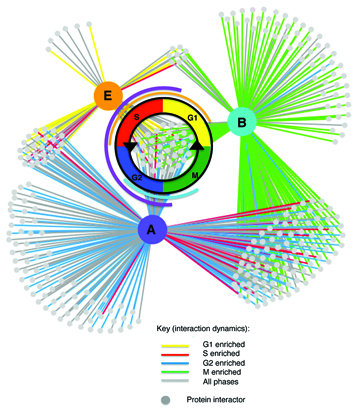Molecular relay race drives cell cycle

Until now, researchers have been unable to understand how different combinations of cyclin-dependent kinases and their activating proteins, cyclins, can regulate distinct proteins and pathways controlling the cell cycle. Traditional in vitro phosphorylation assays have failed to reveal this specificity, and therefore the genetic requirement for multiple cyclin molecules. By taking colonies of cells at different points within the cycle and biochemically isolating proteins associated with different cyclin proteins, it is now possible to follow specific molecular mechanisms within the cells themselves as they take place.
“By isolating sets of proteins associated with different members of the cyclin family and analysing them using quantitative mass spectrometry, we were able to directly compare and quantify the relative amounts of hundreds of substrates of cyclin-dependent kinases. This has given us a time series of in vivo snapshots of the cell cycle that are simply not possible from in vitro experiments. We were able to use the mass spectrometry data to dissect how cyclin proteins direct cyclin-dependent kinases through the entire cell cycle.”
Mark Collins Co-joint first author from the Wellcome Trust Sanger Institute
The puzzle the team wanted to crack was how cyclin-dependent kinases were controlled within the cell throughout the cell cycle. It is known that the actions of these enzymes are vital in driving cell division, but it was unknown how specificity was achieved.
“The puzzle with cyclin-dependent kinases is that all the cyclins are known to control the activity of all the cyclin-dependent enzymes in the cell. If all the cyclins bind to all the enzymes, then how can there be the specific control of each enzyme over time? Our approach aimed to answer this by tagging three different cyclins, freezing the process at different points and purifying their associated proteins from the cell.”
Felicia Pagliuca Co-joint first author from the Gurdon Institute
This novel approach produced an unexpected finding: that the enzymes are ‘handed on’ from one cyclin to the next one in the family, which can be compared to a relay race, only in this case a molecular relay race which drives cell cycle. It is this molecular handover that drives the cell cycle process and ensures that the process moves in one direction only.
“We found a molecular handover where one cyclin ‘handed’ on the kinase substrate to the next, and it is this handover that drives the cycle. By actually following the whole process from within the cell we have been able to find a unique control process that could not have been elucidated through in vitro experiments.”
Jyoti Choudhary Joint senior author of the study from the Sanger Institute
It is now hoped that this novel technique will enable researchers to focus on other areas of control within the cell and elucidate new insights into these processes.
“This technique can be used for looking at other time and space-dependent processes in cells, and we are already applying it to the control of mitosis. Understanding the cell cycle has already proved important in learning more about diseases, such as cancer, where controls on the normal cell cycle are disrupted. As we learn more about how the process should work, we are better able to understand when and how the process goes wrong.”
Jonathon Pines Joint senior author from the Gurdon Institute
More information
Funding
This research was supported by Cancer Research UK, the Gurdon Institute, and the Wellcome Trust Sanger Institute.
Publications:
Selected websites
Cancer Research UK
Cancer Research UK is the world’s leading charity dedicated to beating cancer through research.
Wellcome Trust Gurdon Institute
The Wellcome Trust/Cancer Research UK Gurdon Institute is part of Cambridge University. Funding from its two main sponsors, and other sources, supports research into the complementary areas of Cancer and Developmental Biology.
The Wellcome Trust Sanger Institute
The Wellcome Trust Sanger Institute, which receives the majority of its funding from the Wellcome Trust, was founded in 1992. The Institute is responsible for the completion of the sequence of approximately one-third of the human genome as well as genomes of model organisms and more than 90 pathogen genomes. In October 2006, new funding was awarded by the Wellcome Trust to exploit the wealth of genome data now available to answer important questions about health and disease.
The Wellcome Trust
The Wellcome Trust is a global charitable foundation dedicated to achieving extraordinary improvements in human and animal health. We support the brightest minds in biomedical research and the medical humanities. Our breadth of support includes public engagement, education and the application of research to improve health. We are independent of both political and commercial interests.


